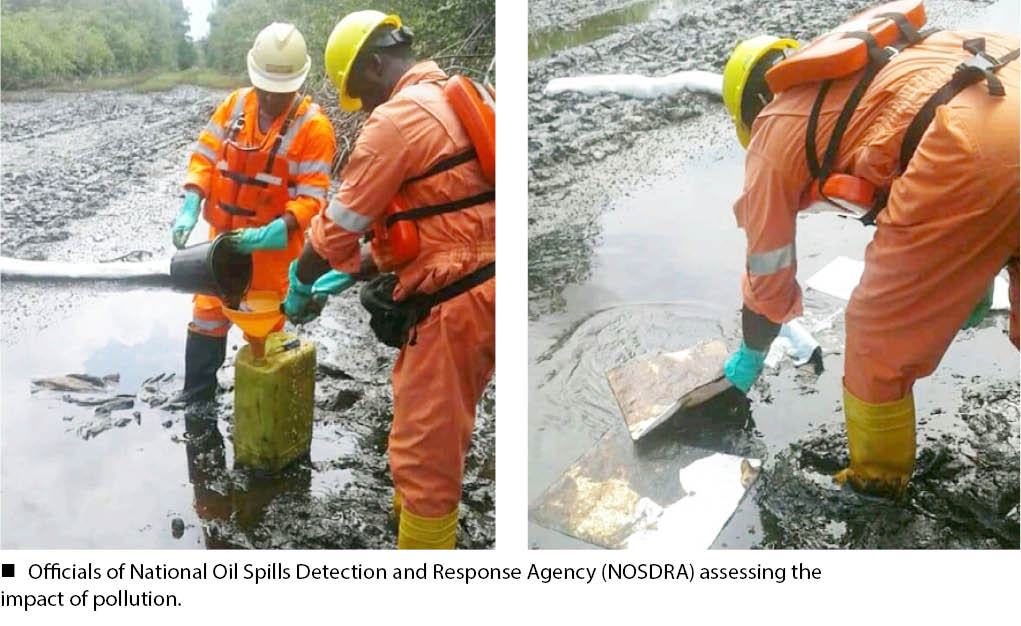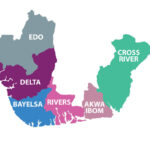The People of Brass Kingdom in Bayelsa State are worried that 48 years of oil pollution might cause serious health hazards that could be mistaken for COVID-19 and are now locked in a tussle with an oil company to save their lives and their communities.
The reported discharge of 2.6 billion barrel of toxic waste over 48 years by the Nigeria Agip Oil Company (NAOC) into communities in Bayelsa State has had the people of Brass Kingdom and Ologbobiri in Southern Ijaw Local Government Area living in a state of panic.
- ‘Oil pollution: 16,000 infants at risk in N/Delta’
- Bayelsa community grumbles over gas flaring, oil pollution
There are worries about air, water and soil contaminations due to oil spills and discharge of toxic waste, which have given rise to concerns that if residents start suffering the health effects, they might be mistaken for COVID-19 symptoms.

Already, there are reports of children and the elderly being struck by unusual ailments that locals suspect might have links to the pollution while fishing and farming, the economic mainstay of the communities, have suffered.
Dead fishes everywhere
Recently, dead fishes have turned up in huge numbers in some riverine communities in the state, especially in the Southern Ijaw and Brass areas and in other Niger Delta states.
The fishermen have blamed the oil spills and gas flaring for this.
Concerned by these developments, elders and youths of Brass Kingdom wrote to the Nigerian Agip Oil Company (NAOC) over alleged delays in the remediation and compensation for the over 2.6 billion barrels of toxic waste dumped into the Brass Canal due to the company’s operations.
According to the elders, Agip’s management has made several promises to the state government and the host communities in Brass to address the concerns but the Italian company has continued to discharge over 150, 000 barrels of toxic waste annually into the Brass Canal.
This, they say, has contaminated the soil, groundwater and the air quality in these areas thereby degrading the health and livelihood of the people.
The letter
Recently, legal counsels of the Kingdom, Iniruo Wills and Dickson Omukoro of Ntephe, Smith and Wills Law Chambers, wrote a letter reminding the company of the urgent need for proper remediation of the ecological damage caused by 48 years of toxic waste discharge at the company’s Brass terminal.
In the letter addressed to the company’s Managing Director, the community said it needs adequate compensation based on impartial impact assessment and a restoration and pollution prevention plan as per best practices.
The kingdom also drew the attention of NAOC’s management to the current long-drawn-out process of finding a lasting resolution to the pollution from the Brass Canal/oil terminal, which has triggered lots of petitions and subsequent exchanges and engagement between Agip, the office of the Minister of State for Petroleum Resources and other regulatory agencies.
In the letter, the kingdom insisted that they are putting the company on notice, “to stop desperate attempts by their officers to compromise or induce key interests aimed at evading regulatory compliance, frustrating the ministerial directive for an independent comprehensive impact assessment and to corruptly waive NAOC’s environmental obligations to the people of Brass Kingdom.”
Oil spilling into creeks
Also blighted by the contamination, the people of Okpoama Kingdom in the same local government area, have sent a save our soul message to the Federal Government
They said that an oil spill occurred two weeks ago on the 24-inch Ogoda-Brass crude oil trunk line operated by the Nigerian Agip Oil Company.
The Chairman of the Okpoama Kingdom Oil and Gas Committee, Percy Jerry Wemi-Kwomain, said that the incident happened at the Amangaetima Bush near Ewoama-Brass.
“The oil spill has discharged enormous amounts of crude oil into the adjourning creeks and rivulets, thereby affecting the environment and the livelihood of the people of the area,” he said.
According to him, NAOC made two secret attempts to fix the leaking pipeline without the usual Joint Investigation Visit (JIV) conducted by relevant authorities but were stopped by youths on surveillance in the area.
“Without letting us know, they came with a swamp-buggy to fix the leak.
“We stopped them twice before they came to inform us that they want us to join them for the JIV.
“The oil is still leaking.
“That is why we have sent an SOS to the Federal Government to come to our aid,” Kwomain said.
Daily Trust gathered that the high-pressure pipeline was built in 1972 and had recorded failures at several points.
The COVID-19 fears
A fisherman in the Southern Ijaw coastline, Emmanuel Dodu, said the incessant oil spills on the oil companies platform have caused untold hardship to the people, thereby ruining their businesses and livelihoods.
He said residents of the Southern Ijaw riverine communities have suffered most from the operations of oil exploitation but cannot do anything to address the issue because the central government and its regulatory agencies are saddled with the responsibilities of monitoring the activities of oil companies as regarding the health of the people.
“We are helpless,” he said, “I have been doing business here since the early ’80s; it’s the same problem from year to year.
“We have endured it for a very long time.
“We have been living with this pollution, contaminated water, air and land for many years, but our fear now is the current COVID-19.
“If COVID-19 meets oil pollution in the air, that means we are finished.
“Though I pray COVID-19 should not reach here, because we have already suffered from air pollution, but oil companies must always endeavour to check their facilities.
“It’s not all about doing business and making money; they should maintain their equipment and prevent it from leaking,” he said.
Already, the National Oil Spills Detection and Response Agency (NOSDRA) has ascribed the two leaks from Agip’s oilfields in Southern Ijaw and Brass local government areas to equipment failure.
According to the Director-General of NOSDRA, Mr Idris Musa, officials of the agency conducted a Joint Investigative Visit (JIV) to Agips 10” Cough Creek-Tebidaba pipeline at Ologbobiri in Southern Ijaw LGA and found the cause to be equipment failure.
Musa said that officials of the agency also visited the 24” Ogoda-Brass trunk line site at Okpoama in Brass, where a leak discharged a yet-to-be ascertained volume of crude oil into the environment.
Reacting on the disagreement between Agip and its host communities, the NOSDRA boss said that the JIV was done and concluded amicably.
“The host community wanted to be paid a fee before repairs.
“That was the source of the disagreement, but the matter was later resolved,” he said.
Agip’s spokesperson for Africa, Mr Cioni Marilia, was said to be outside the country when Daily Trust tried to reach him and the phone number given for him was not reachable up until press time.
In the meantime, the people of Brass will continue to ingest the toxic waste that poses an immediate danger to their lives and way of living and hope that COVID-19 doesn’t strike to make matters worse.

 Join Daily Trust WhatsApp Community For Quick Access To News and Happenings Around You.
Join Daily Trust WhatsApp Community For Quick Access To News and Happenings Around You.


